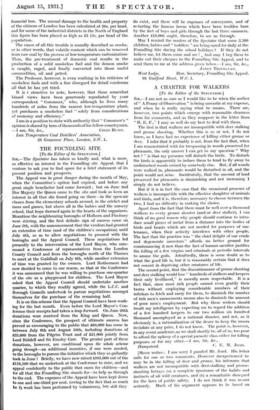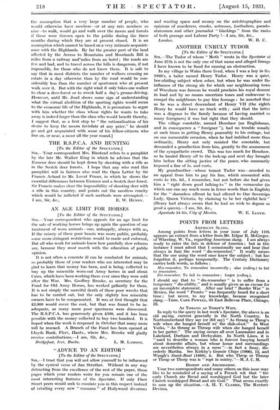A CHARTER FOR WALKERS
[To the Editor of the SPECTATOR.] S1R,—I am not as sure as I would like to be when the author of" A Penny of Observation " is being sarcastic at my expense, and when he is really saying what he means. There are, however, two points which emerge with reasonable clearness from his comments, and as they reappear in the letter from "R. E. F.," I may as well do my best to deal with them.
The first is that walkers are incompatible with deer stalking and grouse shooting. Whether this is so or not, I do not know, as I have had no experience of killing either grouse or deer. I infer that it probably is not, from the fact that, when I am remonstrated with for trespassing in woods preserved for pheasants, the only answer I can get to my question" Why not ? " is that my presence will disturb the birds. To disturb the birds is apparently to induce them to tend to fly away to undisturbed woods owned by somebody else. But, if all woods were walked in, pheasants would be disturbed in all, and the point would not arise. Incidentally, that the amount of land preserved for pheasants is diminishing and not increasing I simply do not believe.
But if it is in fact the case that the occasional presence of walkers is incompatible with the effective slaughter of animals and birds, and it is, therefore, necessary to choose between the two, I find no difficulty in making the choice.
Apart from the fact that there must be well over a thousand walkers to every grouse shooter (and/or deer stalker), I can think of no good reason why people should continue to intro- duce small pieces of metal from a distance into the bodies of birds and beasts which are not needed for purposes of sus- tenance, when their activity interferes with other people. The fact that the practice was "the chief delight of our crude and degenerate ancestors" affords no better ground for countenancing it now than the fact of human sacrifice justifies the killing of a few virgins and criminals at periodic intervals to amuse the gods. Admittedly, there is some doubt as to what the good life is, but it is reasonably certain that it does not consist in depriving other creatures of life.
The second point, that the discontinuance of grouse shooting and deer stalking would lose" hundreds of stalkers and keepers their only livelihood," is morally more respectable. It is a fact that, since most rich people cannot even gratify their tastes without employing considerable numbers of their inferiors to fetch and carry for them, to diminish the number of rich men's amusements means also to diminish the amount of poor men's employment. But why these writers should insult my intelligence by expecting me to regard the addition of a few hundred keepers to our two million six hundred thousand unemployed as a national disaster, and not, as it obviously is, a rationalization of the desire to keep the moors inviolate at any price, I do not know. The point is, however, in any event academic, as we bhall shortly be, all of us, too poor to afford the upkeep of a special parasite class either for killing purposes or for any other.—I am, Sir, &c.,
[Mom writes : I 8111 sorry I puzzled Mr. Joad. his letter calls for one or two comments. However inexperienced he may be in the killing of deer and grouse, his inference that walkers are not incompatible with deer-stalking and grouse- shooting betrays (a) a complete ignorance of the habits and instincts of all wild creatures, and (b) a remarkable disregard for the laws of public safety. I do not think it was meant seriously. Much of his argument appears to be based on the assumption that a very large number of people, who would otherwise have nowhere—or at any rate nowhere so nice—to walk, would go and walk over the moors and forests if these were thrown open to the public during the three months during which they are at present closed. It is an assumption which cannot be based on a very intimate acquaint- ance with the Highlands. By far the greater part of the land affected by the Access to Mountains and Moorlands Bill is miles from a railway and-miles from an hotel ; the roads are few and bad, and to travel across the hills is dangerous, if not impossible, for those who do not know them. It is safe to say that in most districts the number of walkers crossing an estate in• a day otherwise than by the road would be con- siderably less than the number of sportsmen who at present walk over it. But with the right wind it only takes one walker to clear a deer-forest or to wreck half a day's grouse-driving. However, until Mr. Joad shows some sign of understanding what the virtual abolition of the sporting rights would mean to the economic life of the Highlands, it is premature to argue with him whether the class whose rights he wants to take away is indeed larger than the class who would benefit thereby. I suggest that, as a first step to "the rationalization of his desire to keep the moors inviolate at any price," he should go and get acquainted with some of his fellow-citizens who liye on, or near, a moor all the year round.]































 Previous page
Previous page